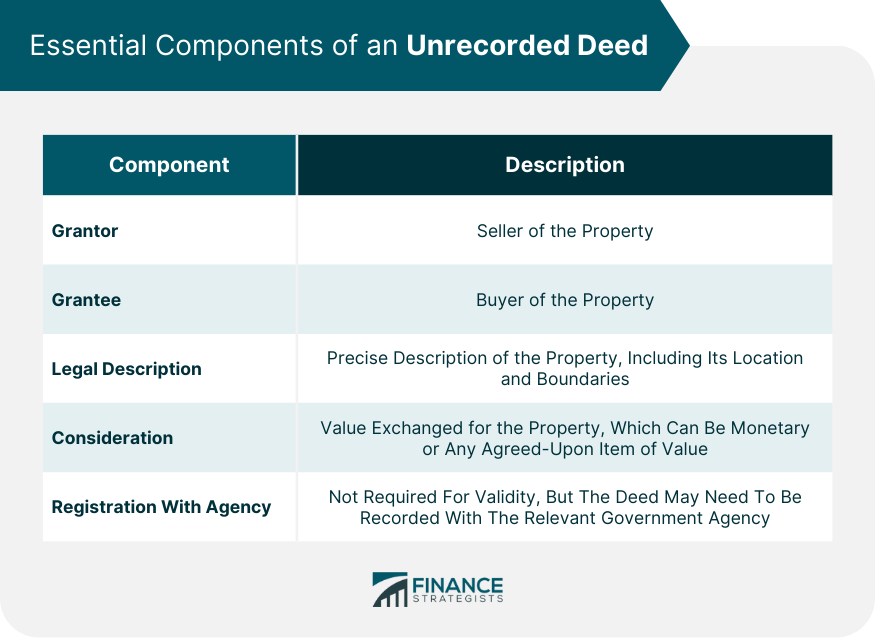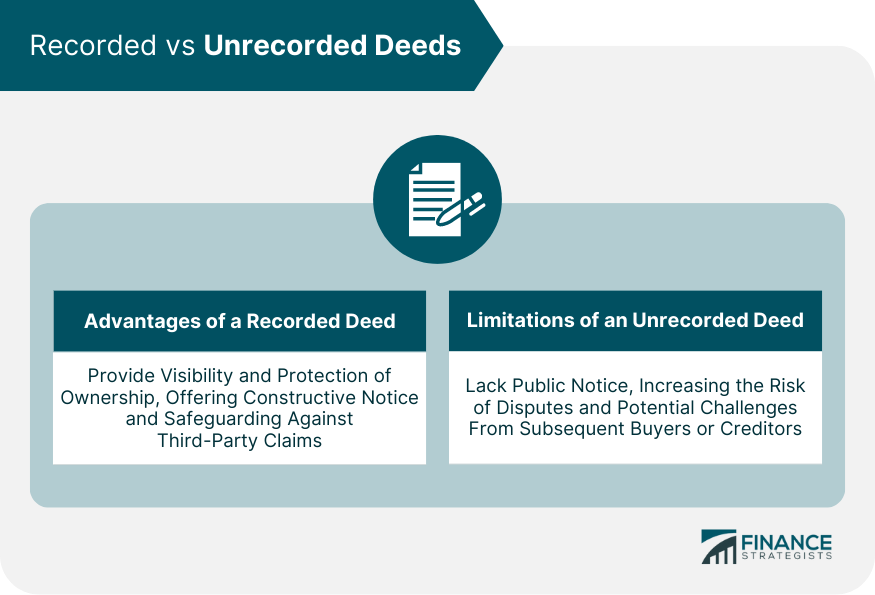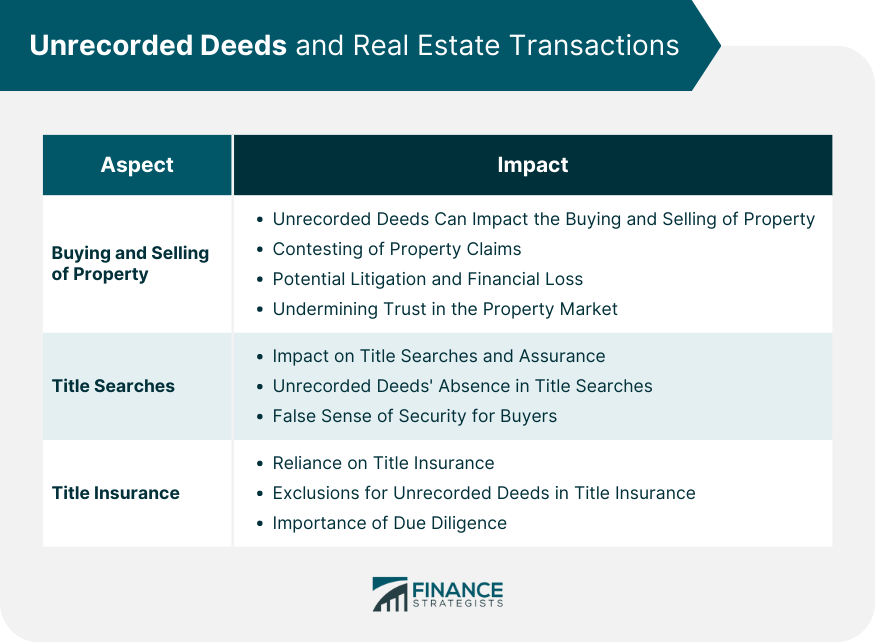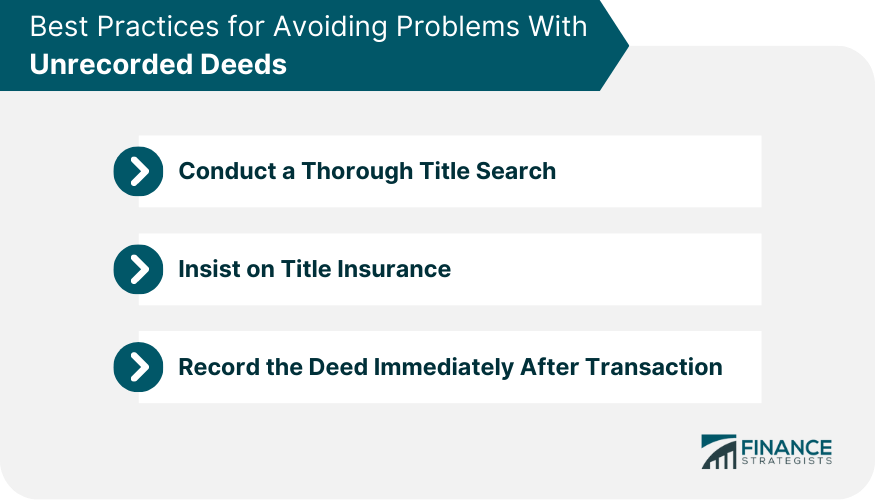In the world of real estate, an unrecorded deed refers to a property transaction document that, while legally executed, hasn't been formally registered with the county recorder's office. These unrecorded deeds are complete, valid, and enforceable between the parties involved. However, without recording, the transfer of property rights may not be known to third parties, creating potential issues in subsequent property transactions. Historically, deeds were conceived as an essential component of property law to provide legal evidence of rights to property. They serve as a mechanism to transfer the title of real estate from one person to another, delineating rights, ownership, and interests. Deeds have always been a core legal tool to establish property boundaries, clarify ownership, and support a secure and orderly property market. Recording the deed was introduced to ensure public notice of the transaction, adding an extra layer of security for property rights. An unrecorded deed is a legal instrument used to transfer the ownership of property. While it may not be registered with the relevant government agency, it still retains its validity between the two parties involved in the transaction. The key elements that compose an unrecorded deed and give it validity include: The grantor, or seller, and the grantee, or buyer, are two essential parties in a deed. Their accurate identification and legal capacity to enter into the transaction are crucial to the deed's validity. A precise legal description of the property involved in the transaction must be included in the deed. This description should detail the property's location and boundaries, ensuring clarity about what exactly is being transferred. The consideration, or the value exchanged for the property, must also be clearly stated in the deed. While typically monetary, consideration can also be anything of value agreed upon by the parties. A recorded deed offers several advantages, primarily centered around visibility and protection of ownership. When a deed is recorded, it gets officially documented in public records. This act of recording gives "constructive notice" to the world, signaling that a property transaction has taken place. It provides a clear chain of ownership, affirming the new owner's claim over the property. With the deed officially part of public records, it shields the new owner from potential third-party claims. Any individual or entity looking to buy or place a lien on the property will be able to discover the recorded deed, thus recognizing the new owner's rights. While an unrecorded deed remains a legally binding document between the grantor and the grantee, it doesn't provide the same level of protection and visibility as its recorded counterpart. Unrecorded deeds do not offer "constructive notice" to the world. As they are not part of the public records, third parties may not be aware of the transaction, leading to potential disputes or confusion about the rightful owner of the property. In the case of an unrecorded deed, a subsequent buyer or creditor, ignorant of the previous transaction, might assert a claim on the property. If they record their deed first, they may hold a superior claim to the property, leading to legal complications for the original grantee. The legal implications of unrecorded deeds are significant. Unrecorded deeds can lead to legal complications, particularly in subsequent transactions involving the property. They can create title defects, potentially exposing the buyer to third-party claims. If a subsequent buyer purchases the property relying on public records (which would not show the unrecorded deed), they may have a superior claim to the property. Laws and regulations regarding unrecorded deeds vary significantly by jurisdiction. In many states, the recording of deeds is governed by the "race-notice" statute or "notice" statute. Under the race-notice statute, the party who records the deed first, provided they have no knowledge of prior unrecorded deeds, holds the superior title. The notice statute protects subsequent buyers who purchase without notice of any prior unrecorded deeds. Understanding these regional differences is crucial in managing the potential risks associated with unrecorded deeds. The concept of notice, both actual and constructive, plays a key role in the legal framework of unrecorded deeds. Actual notice refers to what a party actually knows, while constructive notice is information that a party should have known, as it is contained in the public record. In real estate transactions, recording a deed provides constructive notice to all potential subsequent purchasers or creditors, even if they don't have actual knowledge of the deed. One of the common reasons for a deed going unrecorded is simple negligence. Parties involved in the transaction may overlook the need to record the deed or misplace the document after the property sale. This oversight can be due to a lack of knowledge about the process or unintentional forgetfulness in the midst of a busy transaction period. On a more deliberate note, some parties intentionally avoid recording the deed. This behavior might be driven by a desire to evade property taxes or to hide assets from creditors or legal authorities. Such actions, while potentially advantageous in the short term, can lead to serious consequences, including legal liabilities and penalties. Recording a deed is a straightforward process. The completed deed must be submitted to the county recorder's office, the government body responsible for maintaining public records. This submission is usually accompanied by a nominal recording fee. Upon receipt, the recorder's office stamps the deed with vital details: a recording number, the name of the official receiving the deed, and the date and time of recording. This stamp serves as evidence of the deed being on public record and provides what is known as "constructive notice" to the public—essentially, a public announcement of the change in property ownership. For buyers, the stakes can be high when dealing with unrecorded deeds. Should they fail to record their deed, they run the risk of losing their property rights to subsequent buyers. This is particularly true if the subsequent buyer is unaware of the previous sale and records their deed first. Such a scenario could lead to costly and time-consuming legal battles to establish rightful ownership. Sellers are also not immune to the pitfalls of unrecorded deeds. If a seller were to sell a property that had previously been sold via an unrecorded deed, they could face potential legal liabilities. The new buyer, unaware of the previous transaction, may take legal action against the seller for selling a property they no longer owned. Given these potential challenges and risks, it's always in the best interests of all parties involved to ensure that the deed is promptly recorded following the completion of the transaction. This simple step offers legal protection and peace of mind in the world of real estate transactions. Unrecorded deeds can significantly impact real estate transactions. A buyer who purchases a property with an unrecorded deed may find their claim to the property contested if a previous owner resurfaces with an unrecorded deed. Similarly, a seller may unknowingly sell a property that's been sold before via an unrecorded deed. This can lead to litigation and financial loss, disrupting the typical flow of property transactions and undermining trust in the property market. Title searches and title insurance are integral to real estate transactions, providing buyers with assurance against title defects. Unrecorded deeds can dramatically affect these processes. During a title search, an unrecorded deed won't show up, creating a false sense of security for the buyer. If unrecorded deed surfaces after the transaction, title insurance may be the only line of defense for the buyer. However, it's important to note that title insurance companies often have exclusions for unrecorded deeds, stressing the need for careful due diligence. In cases where issues arise from unrecorded deeds, various legal remedies can be sought. A quiet title action can be filed in court to resolve disputes regarding property ownership. If fraud is involved, parties can sue for damages. The nature and feasibility of these legal remedies vary significantly depending on the jurisdiction and the specifics of the case. Attorneys and real estate professionals play a pivotal role in resolving issues related to unrecorded deeds. They provide the necessary guidance and legal support to navigate the complex process of resolving title defects. Attorneys can represent parties in court to establish rightful ownership, while real estate professionals can offer expert advice and risk assessment to prevent future issues. Unrecorded deeds can cause a myriad of problems for potential homebuyers and property owners, including title disputes, potential fraud, and unexpected legal complications. To prevent such issues, it is important to adhere to the following best practices. A title search is a crucial step in the process of buying a property. It involves a detailed examination of public records to determine the property's legal ownership and whether any liens, mortgages, or other issues could affect the title. The purpose of a title search is to confirm the seller's right to transfer ownership and to discover any potential issues that could limit your use of the property. Engaging a professional title search company can ensure a thorough and accurate investigation. A detailed title search can reveal critical information, such as unpaid taxes, restrictions, easements, or other encumbrances on the property that could affect your ownership rights. It can also help to identify any previously unrecorded deeds which could potentially complicate the transfer of the property. Title insurance is a form of indemnity insurance that protects the holder from financial loss sustained from defects in a title to a property. This is particularly useful in the event of an unrecorded deed surfacing after the property purchase. Title insurance can provide valuable protection against a variety of risks, including unknown liens, encumbrances, or legal judgments against the property. It can also cover the costs of legal defense in the event of a lawsuit challenging your ownership of the property. Therefore, insisting on obtaining title insurance when purchasing a property can safeguard your property rights and give you peace of mind. One of the most effective ways to avoid problems with unrecorded deeds is to record your deed immediately after the transaction. This step serves to provide public notice of the transaction and protects your ownership rights. By promptly recording the deed, you establish a "chain of title" or a historical record of ownership transfer. This helps prevent potential claims against your ownership and can streamline future property transactions. It also protects you from fraudulent activities like deed theft, where someone might fraudulently claim ownership of your property. Conducting a thorough title search, insisting on title insurance, and promptly recording the deed are best practices that every property buyer should follow to avoid problems with unrecorded deeds. These steps can safeguard your investment and protect your property rights. Unrecorded deeds lack public notice, unlike recorded deeds. They contain important information about the parties involved, property description, and consideration. Recorded deeds offer more protection against third-party claims due to constructive notice. To record a deed, it must be submitted to the appropriate government office, typically the county recorder's office. Failing to do so can lead to property ownership disputes. To mitigate risks, conduct a thorough title search, obtain title insurance, and promptly record the deed after the transaction. It is advisable to seek guidance from wealth management or real estate professionals to navigate these complex and risky transactions. This ensures asset protection and confidence in property dealings.What Are Unrecorded Deeds?
Essential Components of an Unrecorded Deed
Grantor and Grantee Information
Legal Description of the Property
Consideration Involved

Recorded vs Unrecorded Deeds
Advantages of a Recorded Deed
Protection Against Third-Party Claims
Limitations of an Unrecorded Deed
Lack of Public Notice
Risk of Third-Party Claims

Legal Framework Surrounding Unrecorded Deeds
Legal Implications of Unrecorded Deeds
Various Laws and Regulations in Different Jurisdictions
Role of Constructive Notice and Actual Notice
Reasons for Unrecorded Deeds
Overlooked Responsibilities and Negligence
Intentional Avoidance of Recording
Step-By-Step Process of Recording a Deed
Submission to the County Recorder's Office
Stamping and Constructive Notice
Assessing the Consequences of Unrecorded Deeds
Risks to Buyers
Potential Liabilities for Sellers
Unrecorded Deeds and Real Estate Transactions
How Unrecorded Deeds Can Impact the Buying and Selling of Property
How Unrecorded Deeds Affect Title Searches and Title Insurance

Resolving Issues Related to Unrecorded Deeds
Legal Remedies for Issues Stemming from Unrecorded Deeds
Role of Attorneys and Real Estate Professionals
Best Practices for Avoiding Problems With Unrecorded Deeds
Conducting a Thorough Title Search
Importance of a Detailed Title Search
Insisting on Title Insurance
Role of Title Insurance in Protecting Property Rights
Recording the Deed Immediately after Transaction
Importance of Prompt Deed Recording

Final Thoughts
Unrecorded Deeds FAQs
An unrecorded deed is a legally binding document used in property transactions that have not been officially recorded with the appropriate government agency.
Unrecorded deeds do not provide public notice of the transaction, making them invisible to third parties. This could lead to potential ownership disputes and issues with subsequent property transactions.
The risks can be mitigated through a thorough title search, obtaining title insurance, and promptly recording the deed after the transaction. Seeking professional advice is also recommended.
Yes, an unrecorded deed is legally valid between the parties involved in the transaction. However, it might not protect against claims from third parties unaware of the transaction.
The main difference lies in public notice: a recorded deed is documented in public records, providing "constructive notice" to the world. In contrast, an unrecorded deed, while legally binding between the parties, doesn't provide such notice.
True Tamplin is a published author, public speaker, CEO of UpDigital, and founder of Finance Strategists.
True is a Certified Educator in Personal Finance (CEPF®), author of The Handy Financial Ratios Guide, a member of the Society for Advancing Business Editing and Writing, contributes to his financial education site, Finance Strategists, and has spoken to various financial communities such as the CFA Institute, as well as university students like his Alma mater, Biola University, where he received a bachelor of science in business and data analytics.
To learn more about True, visit his personal website or view his author profiles on Amazon, Nasdaq and Forbes.













